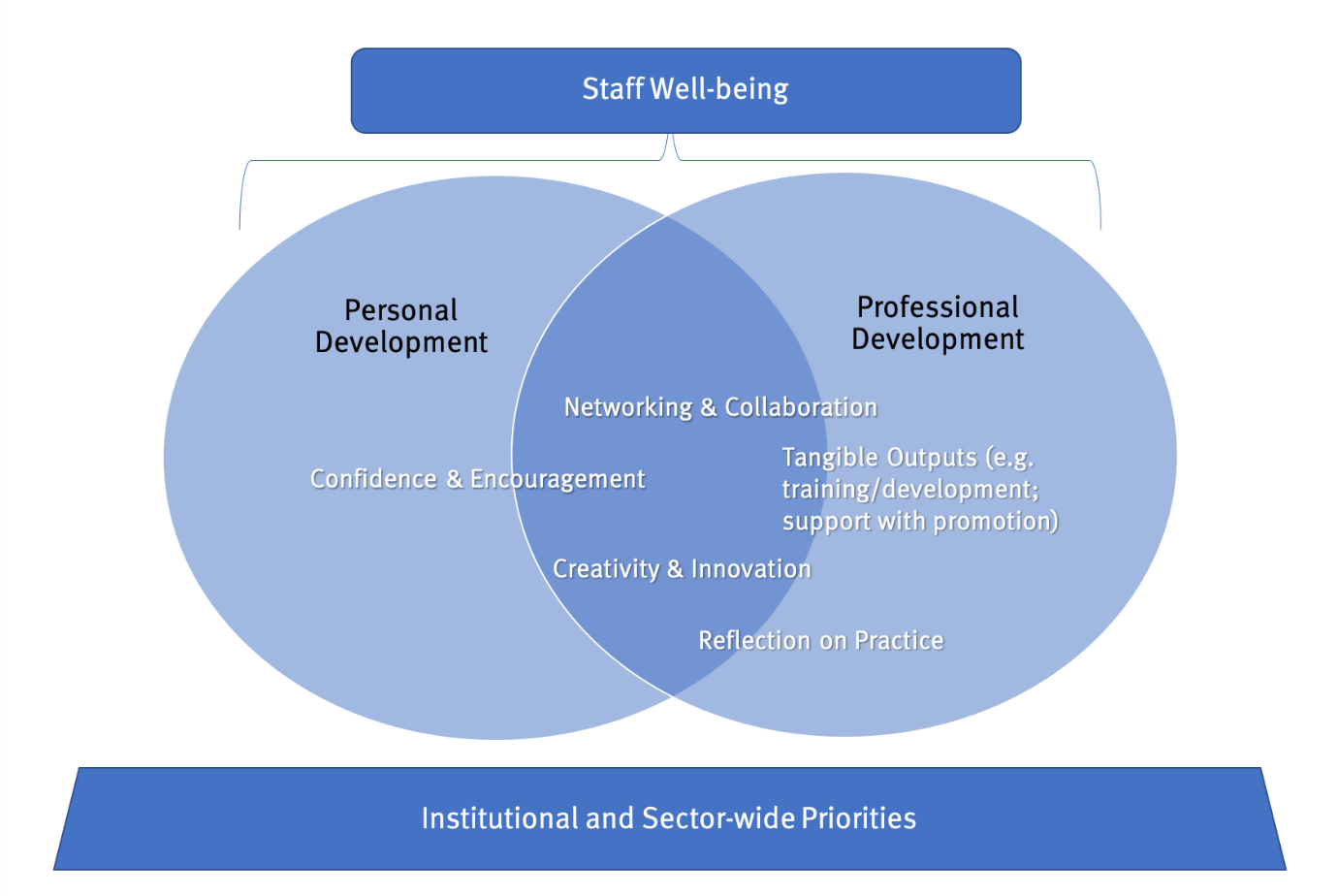Katy Savage from the University of Strathclyde shares the findings of her research for the Peer Network Toolkit and how the toolkit can help others in implementing successful networks in their own institutions.
Peer networks are a key part of academic development for learning and teaching at the University of Strathclyde, and a developing part of the provision at Glasgow Caledonian University. In 2020, as successful recipients of an Advance HE Good Practice Grant, we came together as a cross-institutional collaboration to evaluate the experience of staff engaging in peer support networks, and to create a toolkit for use by individuals across the sector to initiate or enhance peer support provision in their own contexts.
The full project report and the toolkit produced can be accessed here
The evaluation
Our evaluation of peer networks indicated that at their heart, the networks support staff wellbeing, and they do this by contributing to staff personal and professional development. Effective facilitation ensures that the activities of the network connect to institutional and wider strategies and priorities.
Figure 1 below summarises the main themes of the benefits of peer networks that participants told us about.

By creating spaces for socialisation outside of ‘routine’ work settings, peer support networks can break down perceived barriers and hierarchies. This has intrinsic benefits, including exposure to new and challenging ideas, reflection and sharing of practice, creativity and innovation.
Participants told us that they value the opportunity to meet and interact with staff from outside of their disciplinary or departmental ‘bubbles’, and, in some instances, opportunities for cross-Faculty, meaningful, output-focused collaborations had emerged including conference papers, poster presentations, publications and funding applications. The networks generally promoted positivity, encouragement and operated in an atmosphere of acceptance. Staff often described the value of speaking freely about their challenges without fear of reproach.
Participants told us:
On wellbeing…
“Possibly the biggest impact. Participating in these have provided me with a University-wide group of like-minded academics that are happy to share and support. Universities could do with more of these networks to provide cross-institution groups that can just discuss and support, and not push outcomes. These groups are free of Faculty/Department/Course constraints/woes and are always worth attending.”
On promotion…
“I also got a promotion to senior teaching fellow quite recently and I think the peer networks played a big role in that…”
On value and positivity…
“I’ve got an awful lot out of meeting people … and actually coming away enthused about teaching in a way that I don’t always … I don’t finish a day’s labs enthused about teaching, I’m sort of drained. And so I do see these peer groups as a way of being re-energised”
On collaboration…
“Peer networks, break down the silos and break down the walls”
“Participating in these (Networks) has provided me with a university-wide group of like-minded academics that are happy to share and support. Universities could do with more of these networks to provide cross-institution groups that can discuss and support”
You can hear more directly from our participants in this video
The toolkit
Having listened to what our evaluation participants told us, and incorporating experiences from facilitators, we set about creating a toolkit designed to support colleagues in other institutions to implement peer networks in their own context.
The interactive resource contains all of the outputs developed during the project including:
- the final project report
- an infographic summarising the benefits of peer networks
- a video of our participants discussing peer networks
- a podcast, “In conversation with Network Facilitators”
- facilitator resources for starting and sustaining a Peer Network.
This project is part of the 2020 Good Practice Grants, which helped Advance HE members to develop and share innovative practice. Advance HE members can access Peer Support Networks: Evaluation and Toolkit/video resource production here.
About the author: Dr Katy Savage is the Academic Development Lead for Learning and Teaching at the University of Strathclyde. This blog is based on work carried out as part of a research collaboration with Dr Sean Morrissey (University of Strathclyde), Prof Debbie Willison (University of Strathclyde), Dr Kay Guccione (Glasgow Caledonian University), and Dr Jenny Zike (University of Strathclyde).
This blog is kindly repurposed from AdvanceHE and you can read the original here: Peer networks: fostering a sense of belonging
